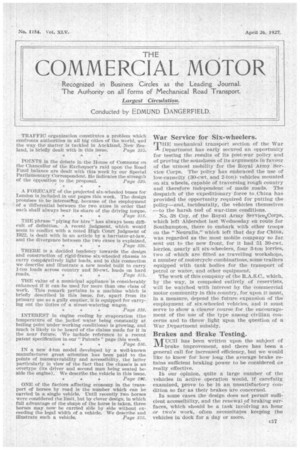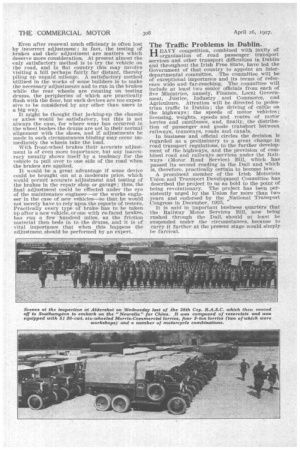War Service for Six-wheelers.
Page 39

Page 40

If you've noticed an error in this article please click here to report it so we can fix it.
THE mechanical transport section of the War Department has early secured an opportunity for testing the results of its past-war policy and of proving the soundness of its arguments in favour of the utmost mobility for the Royal Army Service Corps. The policy has embraced the use of low-capacity (30-cwt. and 2-top), vehicles mounted on six wheels, capable of traversinerough country and therefore independent of made roads. The despatch of the expeditionary force to China has provided the opportunity required for' putting the policy—and, incidentally, the vehicles themselves, —to the harsh tes1 of war-time conditions.
No. 38 Coy. of. the Royal Army ServiceACorps, which left Aldershot last Wednesday en route for Southampton, there to embark with other troops On the "-NeuraIla," which left that day for China, was regarded as the most mobile company so far sent out to the new front, for it had 51 30-cwt. lorries, ,nearly all six-wheelers, four 3-ton lorries, two of which are fitted as travelling workshops, a number of motorcycle combinations, some trailers equipped with tank bodies for the transport of petrol or water, and other equipment.
The work of this company of the R.A.S.C., which, by the way, is composed entirely of reservists, will be watched with interest by the commercial motor community in this country, for upon it must, in a measure, depend the future expansion of the employment of six-wheeled vehicles, and it must serve to show a clearer course for the encouragement of the use of the type among civilian concerns and to throw, light upon the question of a War Department subsidy.
Brakes and -Brake Testing.
Ai-UCH has been written upon the subject of ---"--brake improvement, and there has been a general call for increased efficiency, but we would like to know for how long the average brake retains sufficient braking power to be considered as really .effective. In our opinion, (gate a large number of the vehicles in active operation would, if carefully, examined, prove to be in an, unsatisfactory con
dition so far as their brakes are concerned. •
In some cases the design does not permit sufficient accessibility, and the renewal of braking surfaces, which should be a task involving an hour or two's work, often necessitates keeping the vehicles in dock for a day or more. Even after renewal much efficiency is often lost by incorrect adjustment ; in fact, the testing of brakes and their adjustment are matters which deserve more consideration. At present almost the only satisfactory method is to try the vehicle on the road, and in fiat country this may involve visiting a hill perhaps fairly far distant, thereby piling up unpaid mileage. A satisfactory method utilized in the works of some builders is to make the necessary adjustments and to run in the brakes while the rear wheels are rotating on testing drums, the peripheries of which are practically flush with the floor, but such devices are too expensive to be considered by any other than users in a big way.
It might be thought that jacking-up the chassis or axles would be satisfactory, but this is not always the case, for where wear has occurred in the wheel bushes the drums are not in their normal alignment with the shoes, and if adjustments be made in such circumstances binding may occur immediately the wheels take the load.
-. With front-wheel brakes their accurate adjustment is of even more importance, but any inaccuracy usually shows itself by a tendency for the vehicle to pull over to one side of the road when the brakes are applied.
It would be a great advantage if some device could be brought opt at a moderate price, which would permit accurate adjustment and testing of the brakes in the repair shop or garage; thus, the final adjustment could be effected under the eye of the maintenance engineer—or the works engineer in the case of new vehicles—so that he would not merely have to rely upon the reports of testers. Practically every type of brakehas to be taken up after a new vehicle, or one with re-faced brakes, has run a few hundred miles, as the friction material then beds in to the drums, and it is of vital importance that when this happens the adjustment should be performed by an expert. HEAVY competition, combined with laxity of organization of road passenger transport services and other transport difficulties in Dublin and throughout the Irish Free State, have led the Government of that country to appoint an interdepartmental committee. The committee will be of exceptional importance and its terms of reference wide and far-reaching. The committee will include at least two senior officials from each of five Ministries, namely, Finance, Local Government, Justice, Industry and Commerce, and Agriculture. Attention will be directed to pedestrian traffic in Dublin ; the driving of cattle on the highways; the speeds of motor vehicles ; licensing, weights, speeds and routes of motor lorries and omnibuses, and, finally, the distribution of passenger and goods transport between railways, tramways, roads and canals.
In business and official circles the decision is regarded as a preliminary to a great change in road transport regulations, to the further development of the highways, and the provision of combined road and railways services under the Railways (Motor Road Service) Bill, which has passed its second reading in the Dail and which is, therefore, practically certain to become law.
A prominent member of the Irish Motorists Union and Transport Development Committee has described the project to us as bold to the point of being revolutionary. The project has been persistently urged by the Union for more than two years and endorsed by the .National Transport Congress in December, 1925. It is said in important business quarters that the Railway Motor Services Bill, now being rushed through the Dail, should at least be suspended under the circumstances, because to carry it farther at the present stage would simply be farcical.












































































































